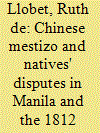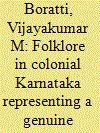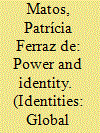| Srl | Item |
| 1 |
ID:
141045


|
|
|
|
|
| Summary/Abstract |
Set in Manila in 1813 during the implementation of the Liberal Spanish Constitution of 1812, this case study of the conflict between natives and Chinese mestizos over seating arrangements in a small parish church demonstrates how the new charter challenged the hierarchies of colonial political space. Despite its centralist aim, the Constitution instead empowered multiple ethnic groups, while reinforcing local notions of self-government and autonomy. Though a brief period, it was a significant one, as natives and Chinese mestizos constructed complex political identities. In turn, these identities set a political precedent which re-emerged during the second constitutional period (1820–23) with more wide-ranging political consequences.
|
|
|
|
|
|
|
|
|
|
|
|
|
|
|
|
| 2 |
ID:
140100


|
|
|
|
|
| Summary/Abstract |
This article offers a comparative study of the multiplicity of folklore scholarship in Karnataka during the colonial period, revealing multiple layers of knowledge, experience and interculturality. It concentrates mainly on viewing three specific collections of Indian folklore by different agents, both colonialists and locals. The overarching aim is to achieve a deeper understanding of various research methodologies and their influence. This article also seeks to address some subsidiary questions regarding the prominence given to oral literature during the second half of the 19th century. It examines what relations, specifically in the eyes of the coloniser and the colonised, it shared with the classical/ancient works of literature of India and seeks to assess the nature of folklore knowledge produced in colonial Karnataka.
|
|
|
|
|
|
|
|
|
|
|
|
|
|
|
|
| 3 |
ID:
129970


|
|
|
|
|
| Publication |
2014.
|
| Summary/Abstract |
This article reflects on the inclusion of human beings in the colonial representations of the great exhibitions that Portugal organised or took part in during the first half of the twentieth century. It analyses the role played by the natives (from the Portuguese colonies), as well as the way they were represented and treated, based on various documents and interviews and on the study of the exhibition creation process. These exhibitions revealed some underlying tensions. On the one hand, they provided evidence of the differences between the 'civilised' and the 'uncivilised', of the diversity of 'races' and of their places in a hierarchy of civilisation. On the other, they extolled the way colonised peoples adopted Portuguese models. The ways those human beings have asserted their existence, under the power of the exhibition's organisers, provides a means to understand how they forged and assumed their identities in a context of rules.
|
|
|
|
|
|
|
|
|
|
|
|
|
|
|
|